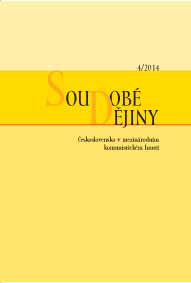Nadřazenost současnosti nad minulostí jako svatá pravda: Po pětadvaceti letech od událostí roku 1989 žádejme od dějepisectví kritický náboj
The Gospel of the Superiority of the Present over the Past: Reclaiming the Critical Potential of History, 25 Years after 1989
Author(s): Pieter LagrouSubject(s): History
Published by: AV ČR - Akademie věd České republiky - Ústav pro soudobé dějiny
Summary/Abstract: This essay is a slightly revised version of the closing lecture given at the international conference ‘Europe between War and Peace, 1914–2004: Turning Points in 20th Century European History’, which was held in Prague from 9 to 11 April 2014. In this essay, the author, a professor of history at the Université Libre de Bruxelles, critically considers a contemporary phenomenon that may reasonably be called the hypertrophy of historical memory. According to the author, it is today typical that an interest in the past is justified by its significance for the present. The author appreciates the contributions of the West European historians who, in the 1970s and 1980s, struggled so that history, which had been usurped by the ruling elites and their policy of offi cial memory, would be returned to democratic debate. Historical controversies had previously divided society here, but many of them have now lost their sting and have been superseded by consensus, serving to provide self-assurance about the moral progress that has been achieved. The author then considers the relationship between the national frameworks of historical memory and supranational European politics. European integration is often presented as a panacea for the disastrous historic confl icts and other problems that have beset Europe, even though this integration is primarily an economic process connected with the building of the welfare state, and it is therefore erroneous to link this process directly to the promotion of peace and human rights. A self-praising, selfsatisfied tone has also been present in Western recollections of the events of 1989 twenty-five years later, though the experts on the topic did not expect the great changes at all. The author asks what the reasons were for the social scientists’ unprecedented failure, and, in connection with 1989, he calls upon thinkers to recall the critical role of history. They should thereby seek to make European recollections of the twentieth century part of a politically relevant discourse, which would be more than merely a generally acceptable self-confi rming celebration in the spirit of the superiority of the bright present over the dark past.
Journal: Soudobé Dějiny
- Issue Year: XXI/2014
- Issue No: 04
- Page Range: 521-530
- Page Count: 10
- Language: Czech

